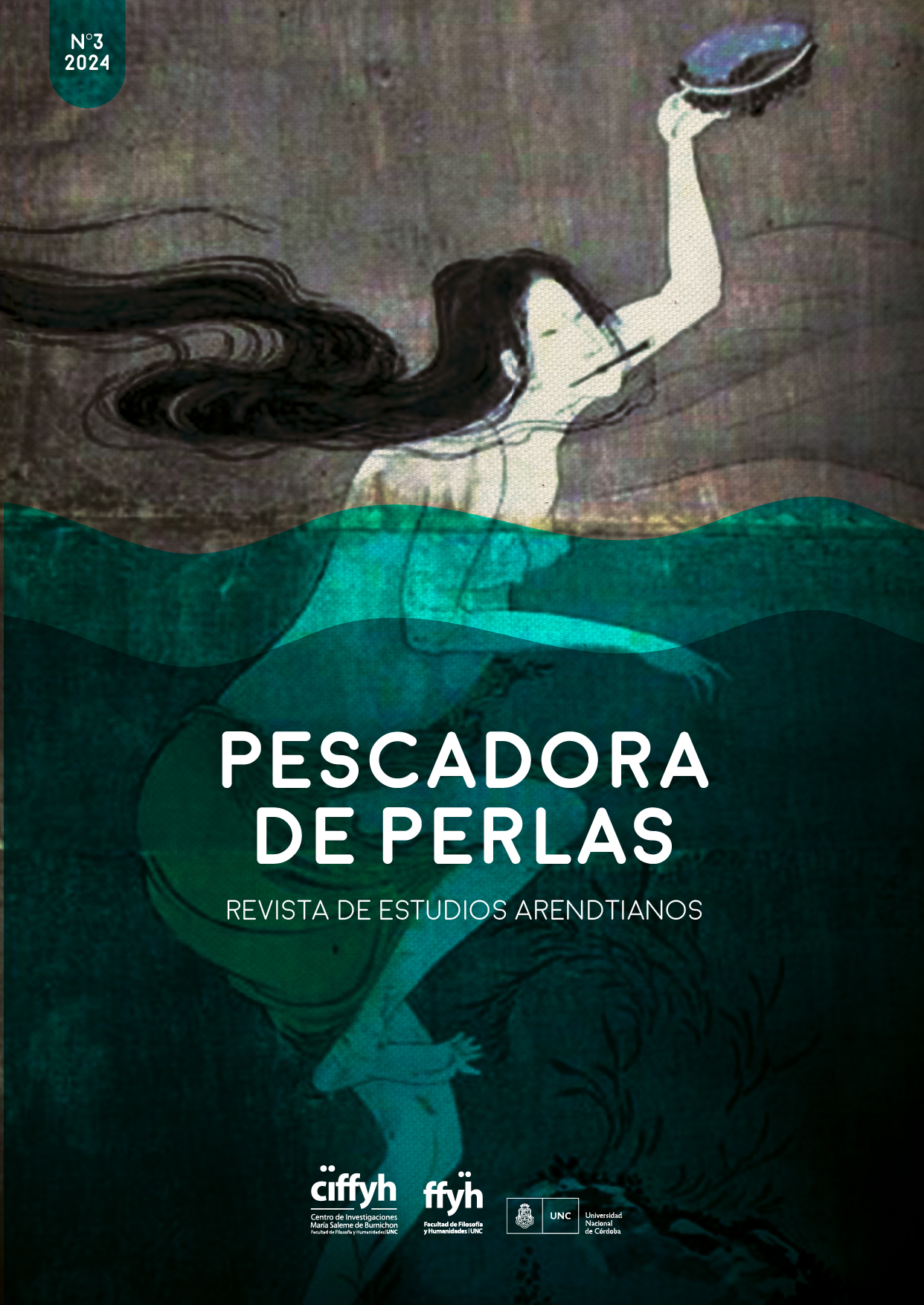Epiphanies of the political
Keywords:
identity, political action, plurality, feminist debatesAbstract
Politics as understood by Hannah Arendt acquires an eminently existential character: grounded in the factum of human plurality, it contributes to postulating a plural ontological framework for feminist theorisation, and to rethink a public sphere understood as the recovery of the ‘being between’ (In Between) that ultimately shapes the world. Political space transcends utilitarian logic and is not identified with any specific place; it is a space of visibility and recognition between one and the other, without eliminating the differences that separate them. It allows them to acquire their own identity, as well as harbouring new manifestations of the political. This article looks specifically at the reflections on difference or otherness, in this case Jewish, and the virtualities that anti-essentialism in its theory of action offers for thinking about a feminist political praxis aligned with democratic principles and not based on gender binarism. Both issues are intimately related. We will begin with a brief approach to the ‘political fact’ as Arendt conceives it, and then investigate feminist debates on difference and political action.
References
Arendt, H. (1996). Entre el pasado y el futuro: Ocho ejercicios sobre la reflexión política. Península.
Arendt, H. (2002). La vida del espíritu. Paidós.
Arendt, H. (2005). La Condición Humana. Paidós.
Arendt, H. (2009). Sobre la revolución. Alianza.
Arendt, H. (2010a). Los Orígenes del Totalitarismo. Alianza.
Arendt, H. (2010b). Lo que quiero es comprender. Sobre mi vida y mi obra. Trotta.
Allen, A. (1999). Solidarity after identity politics: Hannah Arendt and the power of feminist theory. Philosophy & Social Criticism, 25(1), 97-118.
Allen, A. (2016). Emancipación sin utopía: Sometimiento, modernidad y las reivindicaciones normativas de la crítica feminista. Signos Filosóficos, 18(35), 170-196.
Bar On, B. A. (1996). Women in dark times: Rahel Varnhagen, Rosa Luxemburg, Hannah Arendt and me. En May, L. and Khon, J. (ed.), Hannah Arendt. twenty years later, (pp. 70-112). The MitPress.
Bar On, B. A. (2002). The subject of violence: Arendtean exercises in understanding. Rowman & Littlefield.
Birulés, F. (2007). Algunas observaciones sobre identidad y diferencias. Cuaderno Gris 9, Época III, 239-242.
Brown, W. (2019). In the Ruins of Neoliberalism. The Rise of Antidemocratic Politics in the West. Columbia University Press.
Brown, W. (2015). Undoing the Demos: Neoliberalism's Stealth Revolution. ZONE BOOKS.
Cavarero, A. (2021). Piazze Politiche. Corpi Radunati e Pluralitá. Filosofía Política, 1, 89-102.
Cutting‐Gray, J. (1993). Hannah Arendt, feminism, and the politics of alterity: “What will we lose if we win?” Hypatia, 8 (1), 35-54.
Dietz, M. G. (1995). Feminist Receptions of Hannah Arendt. En Honig, B. (ed.). Feminist interpretations of Hannah Arendt, (pp.17-50). University Press.
Disch, L. J. (1994). Hannah Arendt and The Limits of Philosophy. Cornell University Press.
Disch, L. J. (1995). On Friendship in “Dark Times”. En Honig, B. (ed.). Feminist Interpretations of Hannah Arendt, (pp. 285-311). University Press.
Honig, B. (1993). Political theory and the displacement of politics. Cornell Univ. Press.
Honig, B. (1995). Towar an agonistic feminism: Hannah Arendt and the politics of identity. En Honig, B. (ed.). Feminist interpretations of Hanna Arendt (pp. 135-166). Pennsylvania State University Press.
Huzar T. J. (2021). Violence, Vulnerability, Ontology. Insurrectionary Humanism in Cavarero and Butler. En Huzar, T. J., Woodford, C. (eds.) Toward a Feminist Ethics of Nonviolence. Adriana Cavarero, with Judith Butler, Bonnie Honig, and Other Voices, (pp. 151-160). Fordham University Press.
Leibovici, M. (2020). Acción. En Fuster, A. (ed.). Reflexiones para Fina Birulés, (10-28). Icaria.
Maslin, K. (2013). The Gender‐Neutral feminism of Hannah Arendt. Hypatia, 28 (3), 585-601.
Maslin, K. (2020). The experiential ontology of Hannah Arendt. Rowman & Littlefield.
O'Brien, M. (1981). The Politics of Reproduction. Routledge and Kegan Paul.
Pirro, R. (2001). Tragic Reconciliation. Northern Illinois University Press.
Portas Pérez, T. (2022). Derivas contemporáneas del pensamiento político de Hannah Arendt. Differenz. Revista Internacional De Estudios Heideggerianos Y Sus Derivas contemporáneas, (8), 139–153.
Pitkin, H. (1998). The Attack of the Blob: Hannah Arendt’s Concept of the Social. University of Chicago Press.
Rich, A. (1979). On Lies, Secrets and Silence: Selected Prose 1966-1978. W. W. Norton.
Rühle-Gerstel, A. (1932). Das Frauenproblem der Gegenwart-Eine psychologische Bilanz. Hirzel.
Tsao, R. (2002). Arendt against Athens. Rereading The Human Condition, Political Theory, Vol. 30 No. 1, pp. 97-123.
Villa, Dana, R. (1995). Arendt and Heidegger. The fate of the political. Princeton UP.
Downloads
Published
Issue
Section
License
Copyright (c) 2024 Teresa Portas Pérez

This work is licensed under a Creative Commons Attribution-NonCommercial-ShareAlike 4.0 International License.
Consultar los Avisos de derecho de autor. Aquellos autores/as que tengan publicaciones con esta revista, aceptan los términos siguientes:
- Los/as autores/as conservarán sus derechos de autor sobre el texto, y garantizarán a la revista el derecho de primera publicación, el cual estará simultáneamente sujeto a la Licencia de reconocimiento de Creative Commons: Atribución – No Comercial – Compartir Igual (by-nc-sa); no se permite un uso comercial de la obra original ni de las posibles obras derivadas, la distribución de las cuales se debe hacer con una licencia igual a la que regula la obra original.
- Después de la publicación, los trabajos podrán ser reproducidos por los autores en otros medios siempre que no se omita la indicación de la publicación original en esta revista. En este sentido, los autores/as podrán adoptar otros acuerdos de licencia no exclusiva de distribución de la versión de la obra publicada (p. ej.: al depositarla en un archivo institucional o publicarla en un volumen monográfico) siempre que se indique la publicación inicial en Pescadora de Perlas.
- La cesión de derechos de primera publicación de los/as autores otorga a Pescadora de Perlas autorización para que el trabajo sea colocado en el repositorio institucional de la Universidad Nacional de Córdoba y difundido a través de las bases de datos.



